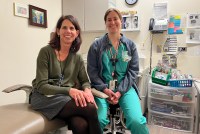Latest KFF Health News Stories
Can You Rely on Your Mammogram To Identify Heart Disease Risk?
Clinicians and researchers are searching for answers to whether an incidental finding on breast X-rays could improve the detection of cardiovascular disease risk among women.
More Restrooms Have Adult-Size Changing Tables To Help People With Disabilities
Adults with disabilities and their caregivers are pressing governments and private businesses across the U.S. to help them avoid undignified public bathroom experiences.
Harris’ Emphasis on Maternal Health Care Is Paying Dividends With Black Women Voters
Polls are showing renewed support from Black women voters for the Democratic ticket. Vice President Kamala Harris has backed key health priorities for Black women.
Tennessee Tries To Rein In Ballad’s Hospital Monopoly After Years of Problems
Ballad Health, a 20-hospital system with the nation’s largest state-sanctioned hospital monopoly, serves patients in Tennessee, Virginia, Kentucky, and North Carolina.
Décadas de programas nacionales contra el suicidio no han frenado estas muertes
Durante los últimos 20 años, funcionarios federales han lanzado tres estrategias nacionales de prevención del suicidio, incluida una anunciada en abril.
Decades of National Suicide Prevention Policies Haven’t Slowed the Deaths
Despite years of national strategies to address the suicide crisis in the U.S., rates continue to rise. A chorus of researchers and experts say the interventions will work — but that they’re simply not being adopted by state and local governments.
Trump, Harris Spar Over Abortion Rights and Obamacare in Their First Face-Off
The generally combative face-off was marked by a series of false and sometimes bizarre statements from former President Donald Trump.
Social Media Bans Could Deny Teenagers Mental Health Help
Congress and state legislatures are considering age bans and other limits for Instagram and TikTok out of concern that they harm kids’ mental health. But some researchers and pediatricians question whether there’s enough data to support that conclusion.
Urgent Care or ER? With ‘One-Stop Shop,’ Hospitals Offer Both Under Same Roof
Hospitals in several states are partnering with a private equity-backed company to offer combined emergency and urgent care in a single building. But patients may not realize prices vary between the two services — often by a lot.
What’s Behind New Combined Urgent Care-ER Facilities
It’s Saturday afternoon, and your 4-year-old is bleeding from a gash on his face after a playtime mishap. Should you go to the emergency room or the urgent care clinic? VHC Health in Arlington, Va., plans to soon join a small but growing number of hospitals moving to resolve this dilemma by offering both types […]
Rescue From Above: How Drones May Narrow Emergency Response Times
Public safety and health care organizations are using drones to speed up lifesaving treatment during medical emergencies in which every second counts.
Colorado Dropped Medicaid Enrollees as Red States Have, Alarming Advocates for the Poor
Colorado defended its high disenrollment rates following the covid crisis by saying that what goes up must come down. Advocates and researchers disagree.
Colorado expulsó a beneficiarios de Medicaid como si fuera un estado republicano
Es el único estado demócrata entre un grupo de estados republicanos con altas tasas de desafiliación, que incluye a Idaho, Montana, Texas y Utah, en un proceso de Medicaid que comenzó en la primavera de 2023.
Indiana Weighs Hospital Monopoly as Officials Elsewhere Scrutinize Similar Deals
If Indiana officials approve a proposed hospital merger in western Indiana in the coming months, the state will have its first hospital monopoly created by a “Certificate of Public Advantage.” Other such deals have resulted in government reports documenting diminished care in Tennessee and North Carolina.
Thousands of Children Got Tested for Lead With Faulty Devices: What Parents Should Know
Faulty lead test kits made by Magellan Diagnostics may have been used as late as 2021 to test children for exposure to the toxic metal. The company agreed to pay $42 million to settle criminal charges that it concealed malfunctions.
Es el último capítulo de una larga saga que involucra a Magellan Diagnostics, con sede en Massachusetts, que pagará $42 millones en multas, según el Departamento de Justicia.
Investigan si los armadillos son responsables de la propagación de la lepra en Florida
La región central de Florida es un foco crítico de esta antigua enfermedad, lo que desconcierta a los científicos que están analizando el fenómeno.
Tennessee Gives This Hospital Monopoly an A Grade — Even When It Reports Failure
Ballad Health, a 20-hospital system in Tennessee and Virginia, benefits from the largest state-sanctioned hospital monopoly in the United States and is the only option for hospital care for a large swath of Appalachia.
The Case of the Armadillo: Is It Spreading Leprosy in Florida?
A single Central Florida county reported 13% of all U.S. leprosy cases in 2020. Researchers have teamed up to investigate whether armadillos are passing the bacteria that cause the disease to humans — which is especially concerning as the animals expand their range farther north.
Doctors Take On Dental Duties to Reach Low-Income and Uninsured Patients
More doctors are integrating oral health care into their practices, filling a need in America’s dental deserts.






















